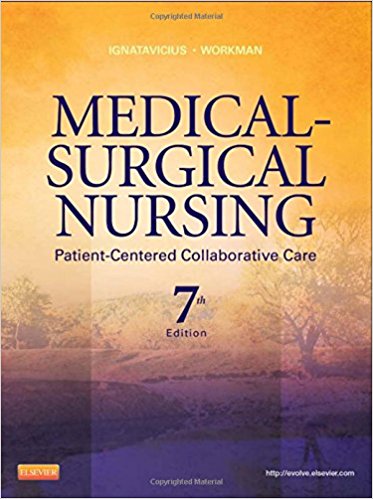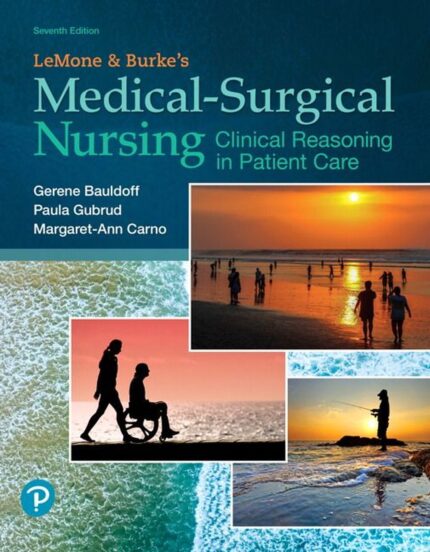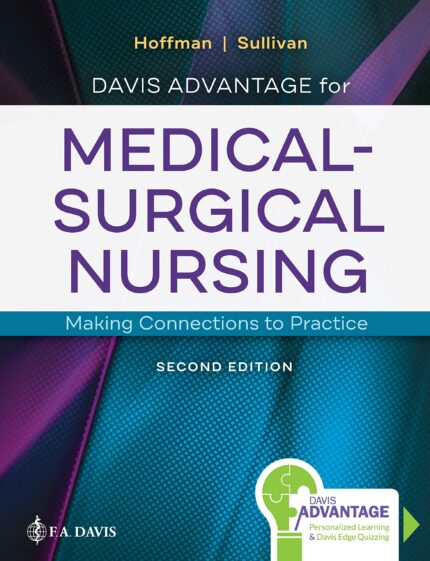Medical Surgical Nursing Patient Centered Collaborative Care, 7th Edition by Donna D. – Test Bank
Chapter 3: Common Health Problems of Older Adults
Test Bank
MULTIPLE CHOICE
1. An older client is agitated and develops new-onset confusion on admission to the long-term care unit. What is the best action for the nurse to take to minimize relocation stress syndrome for this client?
|
a. |
Provide reorientation during hourly rounding. |
|
b. |
Obtain a certified sitter to remain with the client. |
|
c. |
Speak to the client as little as possible to avoid overstimulation. |
|
d. |
Provide adequate sedation to lessen fear-provoking situations. |
ANS: A
Many nursing interventions can prove helpful to older adults who experience relocation stress syndrome. If the client becomes confused, agitated, or combative, the nurse should reorient the client to his or her surroundings. The nurse also can encourage family members to visit often, keep familiar objects at the client’s bedside, and work to establish a trusting relationship with the client.
DIF: Cognitive Level: Application/Applying or higher REF: N/A
TOP: Client Needs Category: Psychosocial Integrity (Stress Management)
MSC: Integrated Process: Nursing Process (Implementation)
2. Which intervention would best support a client who relates a feeling of “loss of control” after having a mild stroke?
|
a. |
Explain that such feelings are normal, but that expectations for rehabilitation must be realistic. |
|
b. |
Encourage the client to perform as many tasks as possible and to participate in decision-making. |
|
c. |
Further, assess the client’s mental status for other signs of denial or psychopathology. |
|
d. |
Obtain an order for physical and occupational therapy evaluations. |
ANS: B
Older adults can experience various losses that affect their sense of control over their lives, including a decrease in physical mobility. The nurse should support the client’s self-esteem and increase feelings of competency by encouraging activities that assist in maintaining some degree of control, such as participation in decision-making and performing tasks that he or she can manage. Obtaining an order for therapy evaluations is a normal part of the rehabilitation process. The other choices imply that the client’s sense of loss is abnormal after a stroke.
DIF: Cognitive Level: Application/Applying or higher REF: N/A
TOP: Client Needs Category: Psychosocial Integrity (Coping Mechanisms; Grief and Loss)
MSC: Integrated Process: Nursing Process (Implementation)
3. What will the nurse teach the older client with hypertension who complains that “food does not taste good without salt”?
|
a. |
Salt can be used as long as blood pressure remains controlled. |
|
b. |
All salt should be removed from the diet to preserve kidney function. |
|
c. |
Table salt can be used in small amounts in conjunction with diuretics. |
|
d. |
Herbs and spices can be substituted to season food. |
ANS: D
Physical changes associated with aging can affect the intake of nutrients. Diminished senses of taste and smell, particularly a decline in the ability to taste sweet and salty, may lead the older adult to overuse sugar and salt. In such cases, the nurse should recommend that the client use herbs and spices to season food.
DIF: Cognitive Level: Application/Applying or higher REF: N/A
TOP: Client Needs Category: Health Promotion and Maintenance (Self-Care)
MSC: Integrated Process: Teaching/Learning
4. What is a priority nursing intervention to prevent falls for an older adult client with multiple chronic diseases?
|
a. |
Providing assistance to the client in getting out of bed or chair |
|
b. |
Placing the client in restraints to prevent movement without assistance |
|
c. |
Keeping all four side rails up while the client is in bed |
|
d. |
Requesting that a family member remain with the client to assist in ambulation |
ANS: A
Advanced age and multiple illnesses, particularly those that result in alterations in sensation, such as diabetes, predispose this client to falls. The nurse should provide assistance to the client with transfer and ambulation to prevent falls. The client should not be restrained or maintained on bedrest without adequate indication. Although family members are encouraged to visit, their presence around the clock is not necessary at this point.
DIF: Cognitive Level: Application/Applying or higher REF: N/A
TOP: Client Needs Category: Safe and Effective Care Environment (Safety and Infection Control—Accident/Injury Prevention)
MSC: Integrated Process: Nursing Process (Implementation)













Reviews
There are no reviews yet.